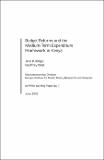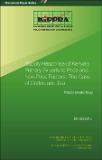| dc.description.abstract | A major concern in liberalizing the coffee trade is the need to harmonize
the legal framework with policy reform. In particular, the legal framework
must change so the institutions previously involved in controlling and
regulating coffee fit in well with the new policy framework. This paper
shows that, despite policy reform in coffee processing and milling, the Coffee
Board of Kenya remains the regulatory agency of the coffee industry and
controls coffee marketing. Processing and milling are dominated by
cooperatives and the Kenya Planters Cooperative Union. Coffee production
has declined due to low use of inputs and neglect of coffee farms. This is
attributed to lack of credit to purchase inputs, high prices for the inputs,
poor delivery of processing and marketing services, and low payments to
farmers. The low payments to farmers are due to high costs of delivery of
services by various institutions, which take up about 60% of the f.o.b.
world market price for smallholder farmers. Re-organization of the various
institutions involved in the delivery of services to smallholder coffee farmers
and enforcement of the rules that govern the delivery of the services is
recommended as key to reducing the high costs. | en |




